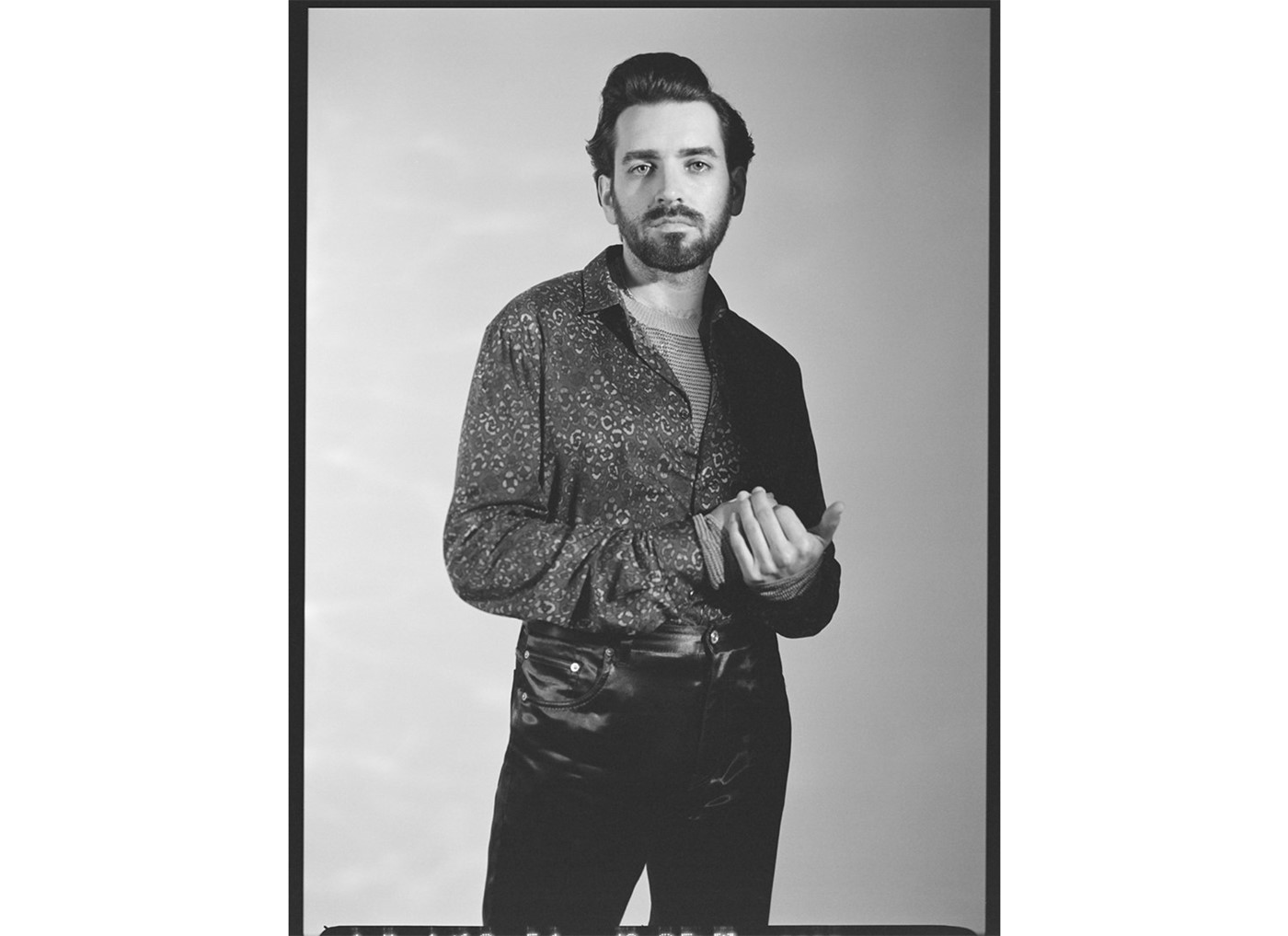Sons of an Illustrious Father: The Another Man Interview
- TextMiss Rosen
- PhotographyMichael James Fox
- StylingMelissa Levy
‘It’s a funeral march for our world we have lost’ – musical trio Lilah Larson, Josh Aubin and Ezra Miller spill on their new LP, which takes on hard-hitting subjects such as the Orlando Pulse shooting, climate change and institutional racism
Inside Lincoln Station, a coffee bar a couple of blocks away from the Brooklyn Museum of Art, Sons of an Illustrious Father have assembled to discuss their new LP, Deus Sex Machina: Or, Moving Slowly Beyond Nikola Tesla, which releases June 1 on their own label in conjunction with Believe.
Now entering their tenth year, the close-knit trio of Lilah Larson, Josh Aubin and Ezra Miller seamlessly flow in conversation as in song, picking up each others sentences and trading quips about their aspirational Muppets.
For the record, Aubin, who wears glasses and sports a full beard, solemnly decrees, “I am Kermit. Kermit is me.” Miller, who is effortlessly chic in a long black coat, “was born in Animal, with a rising in Miss Piggy,” while Larson, who has short hair with a glorious swoop in front, claims Gonzo, “the queer Muppet, obviously.”
“I think that we all are drawn to each other as people because of the intention that we walk in the world,” Larson observes. The Brooklyn-based band first joined forced in 2009 and evolved over the years into their present state, sharing all aspects of songwriting, singing and playing, often trading instruments to get the perfect take.

Their “genre queer” sound evades simple categorisation, drawing from punk, folk, indie and electronica, while channelling the spirit of iconoclasts like Patti Smith, David Bowie and Iggy Pop.
Effortlessly deconstructing false binaries and reductive thinking in search of the greater truth about life, the new album takes on subjects like the Orlando Pulse shooting in U.S.Gay, the grief of living in a world that has now lost half of its biodiversity, the impact of technology of the planet and the mind, and the reality of living in a society built on genocide and racism.
“When we make a song, we are putting ourselves through the process of soaking through those harder feelings in our lives” – Ezra Miller
“Music allows me to process things in way I would otherwise have difficulty processing and allows me to communicate things in ways I otherwise have difficulty communicating. Through that is an avenue of understanding my place in the world around me and the world’s place in me,” Aubin explains.
Miller nods and agrees. The actor, who has started in films including Suicide Squad and Justice League, says, “These songs come out of a time of deciding that hanging upside down was a new view. A lot of our work that precedes this suggests a position of being really overcome by the waves at times and reckoning with that. There is a power that comes when it hits you and breaks you. It can grind you down on the seafloor. I feel like a lot of songs on this album come from the seafloor and being like ‘Wow, coral!’”

This sense of wonder and discovery is ever present in their work, allowing the experience of creating art to reveal itself. On the new album, they have created a space for technology to veer off script, integrating what Larson describes as “sonic earshots that we could not account for” into the music, finding order amid the chaos of our increasingly machine-driven world.
“This is the reality of having technology in the world and the way we use it today. Regardless how far off the so-called grid you go, the truth is that the whole world exists within this energy grid. We are big Lord of the Rings fans and it’s like we are in a ‘There’s not going to be a Shire’ moment. You can unplug from your phone, you can disconnect from the media as much as you want, but media consumes and informs everything. You can’t avoid it forever,” Miller explains.”
“Music allows me to communicate things in ways I otherwise have difficulty communicating” – Josh Aubin
“When we talk about bringing the machine into our work in this album, it’s important to recognise it has always been there. You don’t hear our music unless you come you our living room without various means used to amplify and record it, and media used in various forms to share it with others. On this album, we give the machine a little more attention and license to speak its unknowable mind.”
Those sounds are exquisitely blended into to the sonic tapestry of the work, taking us on a trip through the chaos and turmoil with a sense of possibility and hope. Despite the fact that they describe the album as “a funeral march for our world we have lost,” you can dance to Deus Sex Machina and sweat it all out.

After a decade together they have found peace within the eye of the storm, a place where they can talk about Nicholas Cage as the center of the multiverse or reflect why Martin O’Malley was playing a banjo while campaigning for President in between deeper observations about the nature of life.
Sipping a cold brew, Larson laughs at the idea that that the expectation that they would be serious and intense. “It’s such a trite phrase, but if you don’t laugh you’ll cry. We still do cry but we spend an equal amount of time laughing hoarsely as crying,” she says, then quickly adds, “Depends on the day though.”
“I think that we all are drawn to each other as people because of the intention that we walk in the world” – Lilah Larson
Miller picks up the thread: “When we make a song, we are putting ourselves through the process of soaking through those harder feelings in our lives. I think it’s relieving for us. We’re trying to bring an ice cube into the hot tub. We want people to hear it in the music, to be able to process stuff that is hard and to be able to – it’s always the struggle in life to be able to bring opposites into balance.”
Sons of an Illustrious Father’s new LP, Deus Sex Machina: Or, Moving Slowly Beyond Nikola Tesla, is out June 1.
STYLING ASSISTANT Emma Souse; HAIR Benjamin Muller @ Art + Commerce; MAKE-UP Linda Gradin @ L’Atelier NYC.












